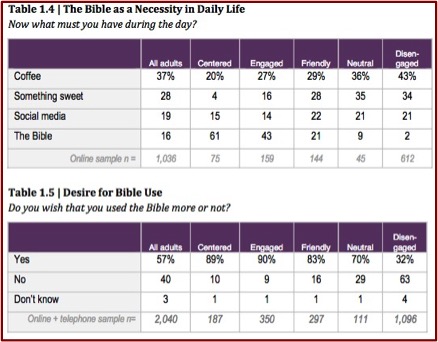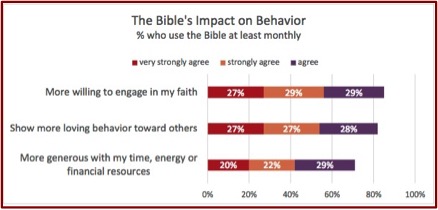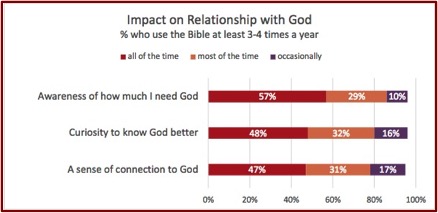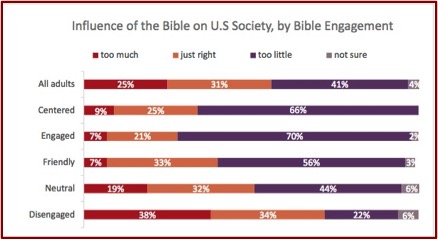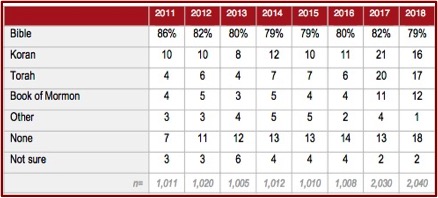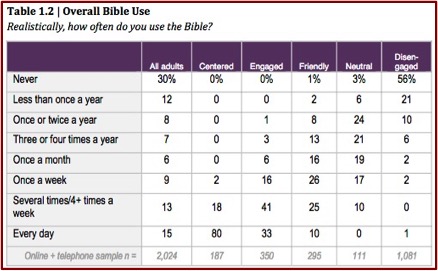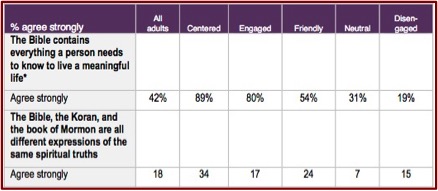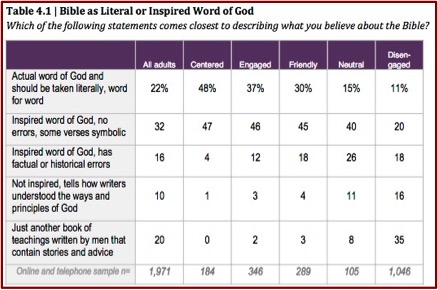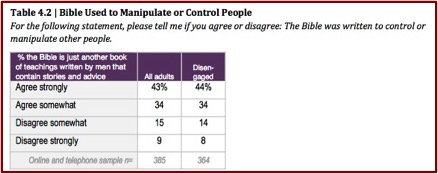Biblical Engagement and Influence, Part 2

When adult Americans were asked what they must have each day, 37% said they needed coffee. That may not be surprising news, but given the survey, “The State of the Bible 2018,” and the options in the multiple-choice question it may be. The four choices given in ranked order were: coffee (37%), something sweet (28%), social media (19%) and the Bible (16%). If the same survey found 70% of adult Americans believe the Bible is the inspired word of God to some degree—but only 16% see it as something they need in their lives on a daily basis—that may explain why so many Americans have difficulties navigating through life with their moral compass.
In Part 1 of this article, we looked at what the “State of the Bible Study 2018” said about topics such as beliefs on the Bible and other sacred texts (the Koran, the Torah and the Book of Mormon), engagement with the Bible, beliefs on whether the Bible is the literal or inspired word of God, and others. Here we will look at what people believed about how the Bible influences their daily life, its impact on thoughts and behaviors, the Bible’s role in U.S. Society, whether the Bible is the moral fabric of our country and belief on the influence of the Bible on social and political issues.
The organization conducting the survey, the Barna Group, sorted its study participants into five segments of Bible Engagement. The percentages of study participants who fit within the five segments are in parentheses. The five segments from the highest to the lowest engagement were: Bible Centered (9%), Bible Engaged (17%), Bible Friendly (15%), Bible Neutral (5%) and Bible Disengaged (54%). See Part 1 for a discussion on how the Barna Group developed their sense of Bible Engagement.
Not surprisingly, as the level of Bible Engagement fell, the importance of the Bible as a necessity in daily life fell as well: Bible Centered (61%), Bible Engaged (43%), Bible Friendly (21%), Bible Neutral (9%) and Bible Disengaged (2%). Bible Centered adults were the only segment where a majority thought the bible was a daily necessity. More than half of all adults wish they used the Bible more (57%). Interestingly, significant majorities of most of the segments of Biblical engagement wished they used the Bible more. “The vast majority of Centered (89%), Engaged (90%), Friendly (83%) and most Neutral (70%) also have an appetite for greater time with the Bible.” Only one in three Disengaged (32%) are interested in spending more time with the Bible. See the following Tables from the study.
Adults who reported using the Bible in the past month were asked a series of questions on what impact, if any, the Bible had on their thoughts and behavior. More than half of monthly Bible users strongly (or very strongly) agreed it influenced their willingness to engage in their faith more (56%), and to show more loving behavior to others (54%). Forty-two percent strongly agreed using the Bible in the past month influenced them to be more generous with their time, energy or finances. Another 28-29% agreed there was some influence on these behaviors as a result of their monthly use of the Bible. See the following graphic from the study.
Adults who used the Bible at least 3-4 times per year say (most or all of the time) they have a sense of connection to God (47% and 31%) and an awareness of how much they need God (57% and 29%). They also report having a curiosity to know God better (48% and 32%). See the following graphic from the study.
Increased levels of Bible Engagement meant there was a greater of awareness among study participants of how much they needed God (ranging from 87% to 8% between the Bible Centered and the Bible Neutrals), of having a connection to God (ranging from 83% to 10% between the Bible Centered and the Bible Neutrals) and having a curiosity to know God (ranging from 86% to 6% between the Bible Centered and the Bible Neutrals).
Intriguingly, individuals with the lowest level of Bible Engagement, the Disengaged, were an exception. Disengaged individuals who read the Bible at least 3-4 times per year were more aware and curious than the next highest Engaged group, the Neutrals. The Disengaged who read the Bible at least 3-4 times per year were aware of their need for God most or all of the time (65%), had a sense of connection to God most or all of the time (62%) and were curious to know God most or all of the time (54%). The Neutrals who read the Bible at least 3-4 times per year were aware of their need for God most or all of the time (50%), had a sense of connection to God most or all of the time (39%) and were curious to know God most or all of the time (31%). See Table 2.2 on page 39 of the “State of the Bible Study 2018” for more information.
The percentage of American adults who believe the Bible has too little influence on society is 41%, which is a drop of 7% from the year before. Additionally, 25% of American adults believe the Bible has too much influence on society, almost double that of 2011 (13%). Biblical Engagement and age are factors influencing belief on the influence of the Bible on society. Boomers (53 to 71) are most likely to believe the Bible has too little influence (49%), while Millenials (19-33) and Gen Xers (34-52) believe the Bible has too much influence (33% and 28% respectively). As expected, when Biblical Engagement decreases, the belief there is too much influence of the Bible on society increases, while the belief there is too little influence of the Bible on society decreases. See the chart below on Biblical influence on society from the study.
When asked to choose whether the Bible or the U.S. Constitution was more important for the moral fabric of the U.S., most adults said the Constitution was more important (56%). Levels of Biblical Engagement directly influenced this choice with 80% of Bible Centered individuals believing the Bible was more important, while 76% of the Disengaged thought the U.S. Constitution was more important. See Table 3.4 from the study.
The majority of Americans don’t believe the Bible has much influence on issues like what they buy or the movies and television they watch, or their views on LGBT issues, abortion or refugees. Again levels of Biblical Engagement reflect clear differences with belief in any Biblical influence on these issues. The following table contains the percentages of Americans who agree or strongly agree that the Bible influenced their views on these issues. The highest (Bible Centered) and lowest (Bible Disengaged) segments of Biblical Engagement were compared.
| The Bible has a lot of influence on …? | ||
| Centered | Disengaged | |
| What I buy | 62% | 4% |
| Movies/TV watched | 78% | 3% |
| Views on LBGT issues | 81% | 8% |
| Views on abortion | 84% | 9% |
| Support for refugees | 72% | 5% |
Part 1 of this article centered primarily on how different levels of Bible Engagement influenced beliefs about the Bible itself, whether it was a sacred text, if it contained everything needed to live a meaningful life, was it inspired, how often people used it. Part 2 looked primarily at how different levels of Bible Engagement influenced daily life, thoughts and behaviors and to what extent the Bible influenced various social and political issues. Clearly, higher levels of Biblical engagement meant greater agreement with the importance of the Bible to all these areas.
There is not always agreement on what the Bible teaches about things such as LBGT issues, abortion, war and others. Yet it unequivocally acts as a moral compass for those individuals who acknowledge its inspiration as the Word of God and seek to apply it to these and other issues in their lives. People with high Biblical Engagement won’t always be in agreement with others on important social or political issues. But at least they are trying to use their moral compass to guide their journey instead of simply doing what seems right in their eyes.

